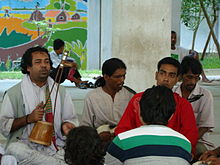There is considerable disagreement among researchers about Lalan’s religious beliefs, which existed even during his lifetime. In an article in Mahatma Lalan published after his death, Vasant Kumar Pal, the first Lalan biographer, said, “I am unable to say for certain whether Saiji is a Hindu or a Muslim. ” It is known from various sources that during Lalon’s lifetime, he was not seen to observe any kind of religious practices. Lalon had no formal education. In his pursuits he acquired knowledge of both Hindu and Islamic scriptures. This is evident in the songs he composed. An article in Pravasi Patrika said that Lalon had good relations with people of all religions. Many considered him a Muslim because of his good relations with Muslims. Seeing him discussing Vaishnavism again, Hindus considered him a Vaishnava. In fact Lalan was a humanist and he did not believe in discrimination of people according to religion, caste, caste, caste, gender etc.
Bengali An article in the monthly Mohammadi published in the month of Ashhad 1348 states that Lalan was born in a Muslim family. Another source states that he was born in a Hindu family. Novelist Sunil Gangopadhyay says about Lalan’s religious beliefs,
“Lalan was religious, but not interested in following any particular religious practices. He broke the ties of all religions and gave humanity the highest place in life
Introducing Lalan, Sudhir Chakraborty wrote,
Kangal Harinath knew him, Mir Musharraf knew him, the Tagores used to travel in houseboats, writers Jaldhar Sen or Akshay Kumar Maitreya had seen him face to face, heard his music, but could not know Lalan’s caste, lineage or religion.
Nurture questions in a song:
When will such a society be created?
The day when Hindus Muslims Buddhists Christians
Jati Gotra Nahi Rabe.
According to some followers of Lalan, such as Montu Shah, he was neither a Hindu nor a Muslim but a follower of a new religious doctrine called Ohedaniyyah. Among Ohedaniyyah there are many other religious doctrines including Buddhism and Vaishnavism, Sahajiya, Sufism. Many of Lalan’s followers refer to Lalan’s songs as Kalam of this spiritual doctrine.
Lalan Akhara, where his shrine is now located
Lalan was basically non-sectarian and believed in humanism.


